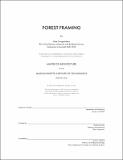Forest Framing
Author(s)
Swagemakers, Jitske
DownloadThesis PDF (119.4Mb)
Advisor
Kennedy, Sheila
Terms of use
Metadata
Show full item recordAbstract
This thesis integrates wild wood research with local knowledge and tools to restore forest ecology and boost rural economies. The proposal is situated in the context of Sweet Home, Oregon, a former logging community. Like many small towns across the United States, Sweet Home is in a state of social and ecological crisis, combating high poverty rates and dwindling resources. Here, industrial mills are abandoned, homes are patched in varying states of decay, and surrounding forests are reduced to arrays of Douglas Fir.
Through a close reading of reciprocal relationships between forestry and wood construction, this thesis outlines a series of wood construction techniques to repair buildings and restore forest habitat. These techniques provide accessible and economical systems of framing, placing special emphasis on the diverse materialities of wood in its natural form, wild wood. Harvesting of wild wood helps prevent the spread of wildfires, it does not contribute to deforestation, and local application would reduce emissions of transportation.
This thesis imagines a restorative future for Sweet Home through a staged transformation of the abandoned mill into a collective wild wood shop, in which wild wood construction techniques are implemented and executed by a cast of community members.
Plates detailing the technical elements of wild wood application, along with construction manuals, build on the community’s receptivity and proficiency to work with wood and are informed by ethnographic research consisting of site visits and interviews with community members. The collective wood shop offers a site for wild wood prototyping and experimental forestry that enhances the material and ecological qualities of wood and feeds back into the forest. This thesis contributes to a reappropriation of wood in architectural construction and offers an economical solution that promotes symbiosis between forestry and architecture.
Date issued
2022-02Department
Massachusetts Institute of Technology. Department of ArchitecturePublisher
Massachusetts Institute of Technology